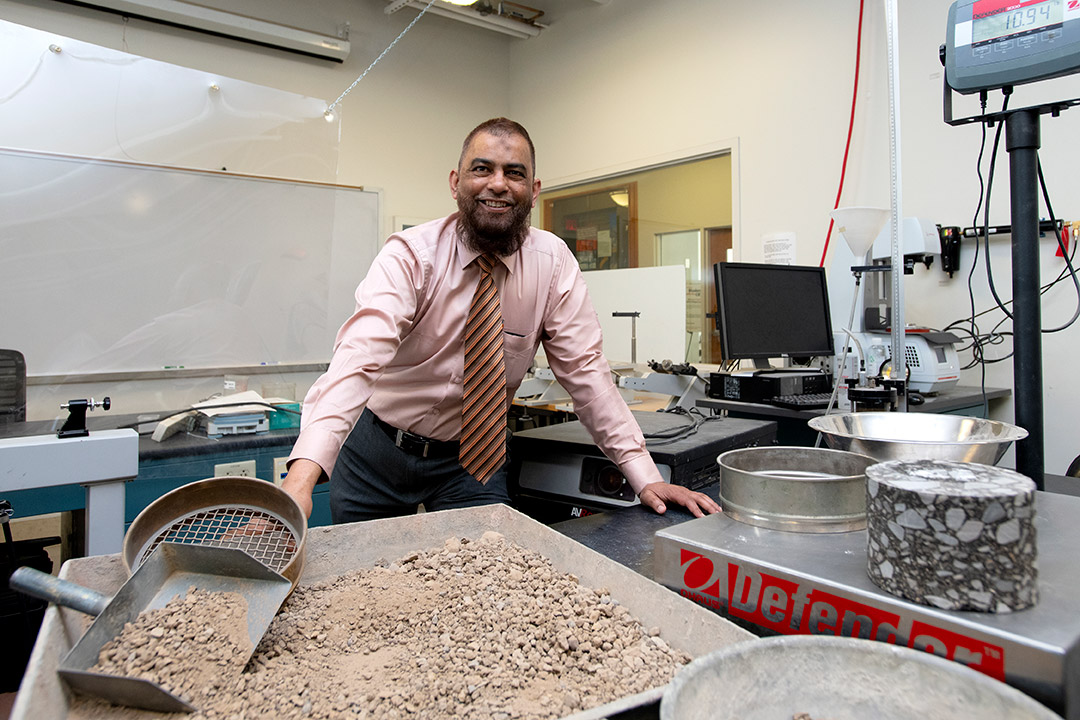Constructing relationships with students and faculty is Abdullah al Faruque’s academic foundation
A. Sue Weisler
Abdullah al Faruque, associate professor in the College of Engineering Technology, was named one of RIT’s outstanding faculty. He is being honored with a 2022 Eisenhart for Outstanding Teaching.
Abdullah al Faruque refers to himself as “just a sidekick” in the larger department of civil engineering technology.
“I work with the best,” he said proudly of his faculty peers, who are as strong as I-beams at teaching students the best ways to engineer structures from buildings to bridges.
Faruque has established himself as more than a sidekick. He is an engineering professional who has shaped a challenging and caring classroom environment and has seen program graduates become successful in the highly competitive engineering and construction fields.
For this, Faruque was honored with the 2022 Eisenhart Award for Outstanding Teaching. Given as one of RIT’s highest recognitions for tenured faculty, it acknowledges those who excel at teaching and enhancing student learning. The associate professor in RIT’s College of Engineering Technology (CET) combines the seriousness needed to share meticulous engineering concepts and still make room in classes to add a personal touch.
Faculty Awards
Meet Jan van Aardt, a recipient of the 2022 Eisenhart Award for Outstanding Teaching, and Jessica Hardin, recipient of the 2022 Provost’s Award for Excellence in Teaching.
“There is no doubt that RIT can make students successful on the professional level, but I want them to be people that can contribute good to society,” said Faruque, who has been with RIT since 2008. He teaches a wide range of civil engineering technology analysis and design courses in the areas of structure, hydraulics, and soil mechanics in CET’s Department of Civil Engineering Technology, Environmental Management and Safety.
Faruque brings more than 22 years in design, construction, management, administrative, and managerial experiences to his classes. Each class combines technical concepts with interpersonal topics such as dealing with bosses and co-workers as well as managing projects in different communities and countries.
“There are many ways one can approach the design. A good designer must understand the location of the project to check if they have the infrastructure or equipment or expertise to build, or you must adapt your design according to the potential of that community. Always, people come first and you need to provide the best for them,” he said.
Finding solutions to class problems are not always straight-forward, and he is humble—a missed part of a mathematics equation, for example, will happen. But it shows humanness, not failure, he explained. Students see that he can be gently teased, and to him, this is an invitation to laugh and solve problems together.
“They may be watching a mistake made, but they end up contributing to a solution,” he said. “That is a very entertaining class where everyone participates in one way or another.”
Faruque was exposed to both academic and non-academic knowledge at an early age. After college and with some local experience, he left his homeland of Bangladesh to become part of what he called the “civil engineering wonderland” in East Asia, specifically working in Singapore, Malaysia.
“That was the time of exceptional growth in that region,” he said.
Afterward, he emigrated to Canada where he combined work with graduate studies at the University of Windsor (Ontario). Teaching followed a professional career and Faruque is committed to working with the next generation of builders with heart.
“I tell my students, whatever you do, do it from your soul,” he said.
That sentiment has been noticed by peers.
“Abdullah engages learners by building relationships, meeting them where they are with what they need. He is the same generous person with his colleagues, mindful of our collective efforts for departmental success,” said Jennifer Schneider, Eugene H. Fram Chair in Applied Critical Thinking, and professor in CET’s Civil Engineering Technology, Environmental Management and Safety Department.
“It is us who are grateful for the opportunity to call him colleague and friend.”









